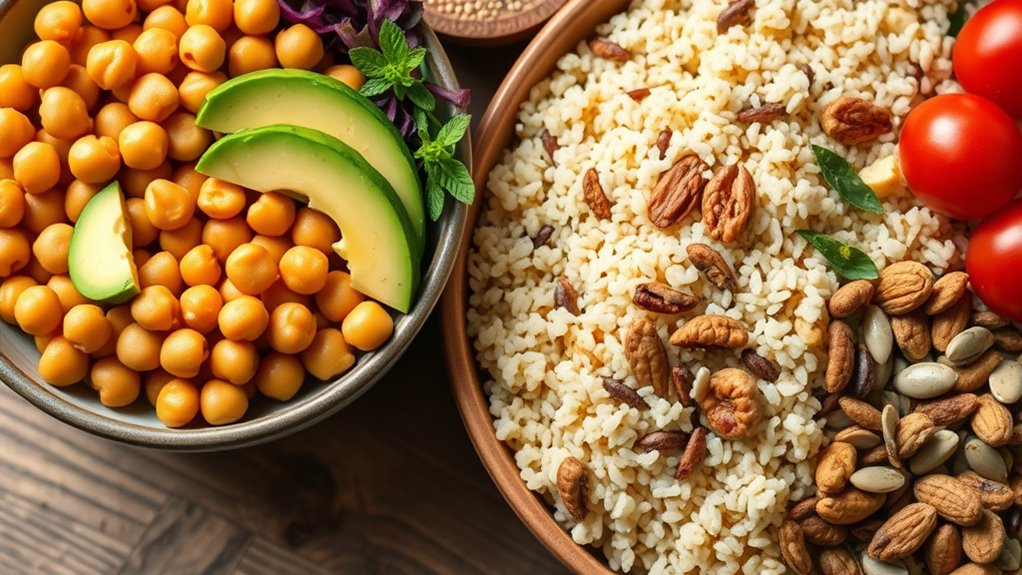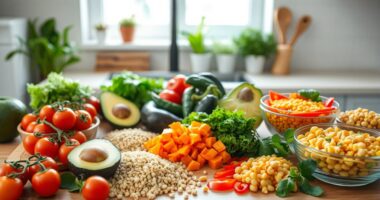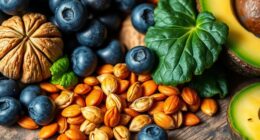To understand your macros on a vegan diet, focus on balancing proteins like lentils, tofu, and tempeh, with complex carbs such as quinoa, sweet potatoes, and brown rice for steady energy. Don’t forget healthy fats from nuts, seeds, and avocados to support hormone health. Proper macro ratios boost energy, satiety, and muscle recovery. If you want to optimize your meals and avoid common pitfalls, explore what’s next for making your diet as balanced as possible.
Key Takeaways
- Vegan diets require careful macro planning to ensure sufficient protein from plant sources like lentils, tofu, and tempeh.
- Carbohydrates such as quinoa, sweet potatoes, and brown rice provide steady energy and should be balanced across meals.
- Healthy fats from avocados, nuts, and seeds are vital for hormone production and cell health on a vegan diet.
- Proper macro ratios support energy, muscle repair, and satiety, preventing nutrient deficiencies and overconsumption.
- Meal timing and composition help optimize nutrient absorption and meet activity or health goals effectively.

Have you ever wondered how to balance your nutrient intake on a vegan diet? Achieving the right mix of macronutrients—protein, carbs, and fats—can seem tricky, but with effective meal planning and understanding nutrient timing, you can optimize your health and energy levels. The key is knowing how these macros work together and how to plan your meals accordingly. When you focus on meal planning, you can guarantee each dish provides a balanced amount of each macro, preventing deficiencies and overconsumption. For example, incorporating a variety of plant-based proteins like lentils, tofu, and tempeh helps meet your protein needs without relying on animal products. Combining these with complex carbs such as quinoa, sweet potatoes, and brown rice keeps your energy steady throughout the day.
Nutrient timing plays a essential role in how effectively your body uses these macros. Eating protein-rich foods within a window after workouts supports muscle repair and growth, while spreading your carbohydrate intake evenly across meals maintains consistent energy levels. Fats, often overlooked, are fundamental for hormone production and cell health, so including sources like avocados, nuts, and seeds in your meals is essential. Planning your meals with macro ratios in mind allows you to avoid common pitfalls, like excessive carb consumption or insufficient protein, which are frequent in vegan diets. It also helps you stay full longer, reducing snacking on less nutritious options.
To optimize your macro intake, consider dividing your day into smaller, well-balanced meals. This approach ensures you get a steady supply of nutrients without overwhelming your digestive system. For instance, breakfast could include oatmeal topped with chia seeds and berries, providing carbs, healthy fats, and a bit of protein. Lunch might be a quinoa salad with chickpeas and avocado, hitting all three macros. Dinner could feature stir-fried vegetables with tofu and brown rice. Snacks like nuts or hummus with veggie sticks also help bridge the gap between meals, keeping your macros balanced throughout the day.
Adjusting your intake based on activity levels and goals is also important. If you’re exercising intensely, you might need more carbs for energy or additional protein for recovery. Conversely, if your focus is weight management, you may want to moderate your intake of certain macros. By paying close attention to meal planning and nutrient timing, you guarantee your body receives the right nutrients at the right times, making your vegan diet sustainable and effective. Ultimately, understanding how to balance macros empowers you to create meals that support your health, energy, and fitness objectives while enjoying a diverse, plant-based diet.
Frequently Asked Questions
Can Vegans Meet All Their Macro Needs Without Supplements?
Yes, you can meet all your macro needs on a vegan diet without supplements. Focus on diverse plant-based snacks like nuts, seeds, and fruits, along with vegan protein sources such as lentils, tofu, and tempeh. Incorporate whole grains and healthy fats to balance your macros naturally. With careful planning, you’ll get enough protein, carbs, and fats to support your health without needing extra supplements.
How Do Macro Ratios Vary for Different Activity Levels?
Think of your macro ratios as a personalized recipe that changes with your activity level. If you’re more active, you’ll need more carbs for energy and slightly more protein for recovery, while less active days call for fewer carbs. Timing your exercise influences this balance, so tracking macros helps you modify accordingly. Whether you’re training intensely or resting, tweaking your macro ratios ensures your body gets what it needs to thrive.
Are There Specific Vegan Foods High in Healthy Fats?
Yes, you can find vegan foods high in healthy fats like avocados and nut oil varieties. Avocado benefits include heart health and anti-inflammatory properties, making it a great choice. Nut oils such as walnut, flaxseed, and chia seed oil provide omega-3 fatty acids essential for brain function. Incorporating these into your diet helps boost healthy fat intake, supporting overall wellness and energy levels.
How Do I Adjust Macros for Weight Loss or Muscle Gain?
They say “you are what you eat,” so adjusting macros depends on your goal. For weight loss, create a calorie deficit by reducing carbs and fats, focusing on protein to preserve muscle. For muscle gain and hypertrophy, increase your calorie intake, especially with quality carbs and healthy fats, while boosting protein. Track progress, stay consistent, and tweak macros as needed to align with your goals.
What Are Common Macro Deficiencies in a Vegan Diet?
You might face common macro deficiencies like inadequate plant-based proteins and iron deficiency. To combat this, include beans, lentils, tofu, and quinoa for protein, and incorporate dark leafy greens, fortified foods, and seeds to boost iron intake. Regularly balancing your meals assures you’re meeting your macro needs, supporting energy, recovery, and overall health on a vegan diet. Monitoring your intake helps prevent deficiencies and keeps you thriving.
Conclusion
By mastering your macros on a vegan diet, you guarantee you’re fueling your body effectively. Did you know that plant-based eaters tend to consume more fiber and antioxidants? This not only boosts your digestion but also lowers chronic disease risk. Remember, balancing protein, carbs, and fats helps you stay energized and healthy. So, keep tracking your macros and enjoy the vibrant, nutrient-rich foods that support your vegan lifestyle every day.










